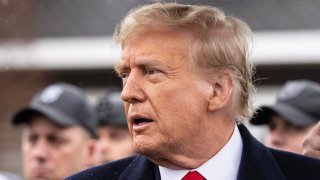Donald Trump's Path to Self-Destruction
Even as Trump’s allies exhort him to focus on policy, he is plainly bored by it, as his speech at the Republican convention demonstrated, preferring to indulge in insults and catcalls rather than disquisitions about industrial policy.
In her novel Pride and Prejudice, Jane Austen has Mary Bennett, the most overtly intellectual of Mr. Bennett’s five daughters, reflect upon the distinction between pride and vanity. “A person may be proud without being vain,” she notes. “Pride relates more to our opinion of ourselves, vanity to what we would have others think of us.”
But what happens when someone is both proud and vain? Enter Donald Trump. In his lengthy colloquy on X with the entrepreneur Elon Musk, who owns, among other things, SpaceX, Trump offered a masterclass in both failings. He was a true Ramblin’ Man, drifting from topic to topic without much of a discernible logic to his musings, other than that they centered, more often than not, on the greatness of one Donald Trump, the only president capable of dealing with Vladimir Putin and a host of bad guys around the globe who apparently love their countries, just in their own peculiar fashion.
The refrains were familiar. Had Trump not been deprived of what was rightfully his in 2020, the world would be in a much better place. No war in Ukraine. No war in the Middle East. No inflation. Musk, Trump’s latest incense burner, put it plainly: “You are the path to prosperity. And I think Kamala is the opposite.” At least for Musk himself, this might well be true, as Trump would be receptive to removing any regulatory obstacles that might impede Musk’s business activities. The same appears to go for the energy industry. The Washington Post reports that the oil tycoon is spearheading the quest to fulfill Trump’s request for a billion in campaign donations.
Trump is clearly eager to direct the spotlight away from Vice President Kamala Harris and back onto himself. As a candidate in 2016 and as president, Trump wielded Twitter less like a rapier than a bludgeon to pulverize his political foes. However, whether X has the juice that Twitter once possessed is highly questionable. The problems were manifest from the outset, when the interview was delayed for almost an hour because of technical difficulties that the social media site was experiencing. Musk declared that it was a massive DDOS attack, but at least one X staffer said this was not true. Instead, Musk’s decapitation of much of the company’s engineering staff appears to be the real culprit for the site’s failure. For his part, Trump lauded Musk for firing employees at Tesla in April: “You’re the greatest!”
The real problem that the interview exposed is that Trump has run out of fresh material. His comments amounted to a greatest hits album that will appeal to longtime fans but is unlikely to attract fresh ones. He needs new material. But if his interview is anything to go by, he appears incapable of engaging in anything other than reflections about his accomplishments from the past, with a dash of grievances about the 2020 election thrown in for good measure.
Harris, by contrast, is marketing herself as what Trump once incarnated, which is change you can believe in. “We’re not going back,” the crowds at her rallies chant. She’s steadily climbing in the polls. A poll conducted by the Financial Times reveals that Harris now narrowly surpasses Trump in voter confidence about who can better guide the economy. In addition, a new USA Today/Suffolk University/WSVN-TV poll indicates that Harris is within striking distance of Trump in Florida—a mere 5 points behind the former president, with 47 percent supporting Trump and 42 percent Harris. It seems improbable that the former swing state would move into the Harris column. Still, the wave of enthusiasm for Harris, propelled by a reenergized base, suggests that Trump is in for much rougher political seas than he had anticipated having to navigate.
Even as Trump’s allies exhort him to focus on policy, he is plainly bored by it, as his speech at the Republican convention demonstrated, preferring to indulge in insults and catcalls rather than disquisitions about industrial policy. He thus opined that Harris is “incompetent,” a “radical left leader,” and “third rate.” At another point, he praised her looks as “beautiful” but weirdly claimed that the portrait of her on the cover of Time resembled his wife, Melania. What Melania made of his remark may be wondered. Perhaps she will respond by pulling the jacket out of her wardrobe with the famous message, “I don’t really care, do u?”
About the Author: Editor of the National Interest, Jacob Heilbrunn
Jacob Heilbrunn is editor of The National Interest and is a nonresident senior fellow at the Atlantic Council’s Eurasia Center. He has written on both foreign and domestic issues for numerous publications, including The New York Times, The Washington Post, The Wall Street Journal, Financial Times, Foreign Affairs, Reuters, Washington Monthly, and The Weekly Standard. He has also written for German publications such as Cicero, Frankfurter Allgemeine Zeitung, and Der Tagesspiegel. In 2008, his book They Knew They Were Right: the Rise of the Neocons was published by Doubleday. It was named one of the one hundred notable books of the year by The New York Times. He is the author of America Last: The Right’s Century-Long Romance with Foreign Dictators.


